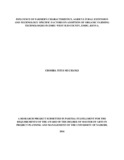| dc.description.abstract | Farmers’ training is intended at promoting uptake of knowledge and skills, changing of attitudes
and making farmers achieve their aspirations. When improved agricultural practices are
systematically and effectively delivered, farmers’ training is known to enhance adoption of
improved agricultural practices and finally improve the social and economic development of the
farmer. This study was conducted to assess the influence of farmer’s social-economic
characteristics, Agricultural extension and Technology specific factors on enhancing adoption of
the improved organic farming technologies among trained farmers in Embu west sub-county,
Embu County, Kenya. A descriptive sectional survey design was applied in the study and data
was collected from Three hundred (300) trained organic farmers. The results of descriptive
analysis showed that, awareness of the Organic Farming Technologies in Embu west Sub County
was high among all the farmers across different socio-economic backgrounds. Among the socioeconomic
characteristics of the farmers that were found to be influencing their adoption decision
of the entire package were level of formal education, gender and off-farm income. Age of the
farmer, farm size and contact with technology promoters did not affect their adoption decision.
The technology-specific attributes that negatively influenced adoption of the entire package
included cost involved, complexity of the technology and high perceived risks. Adopters of the
entire package were motivated to do so by the benefits of high yields realized from adopting the
entire package and the fact that they perceived that the cost of farming was low especially for
farmers who had enough organic waste for composting and enough labour. Among the adopters
of the entire package, about 60% reported that they have been harvesting an estimate of more
harvest per acre per season as compared to seasons before adopting entire organic farming. Many
non-adopters cited technology-specific attributes of costs, complexity and perceived risks as the
major factors that hinder their efforts to adopt the entire package. Overall, the factors that
influence adoption of the Organic Farming Technologies in Embu West Sub County seem to lie
more on technology-specific attributes and economic constrains other than the social
characteristics of the farmers. The findings of this research project provide useful information
which can be used by Africa Children Education Fund to evaluate the impacts, effectiveness and
sustainability of the farmers training project they sponsored. The study provide useful data and
recommendations which can be used by future researchers and training institutions dealing with
farmers training and extension. | en_US |



